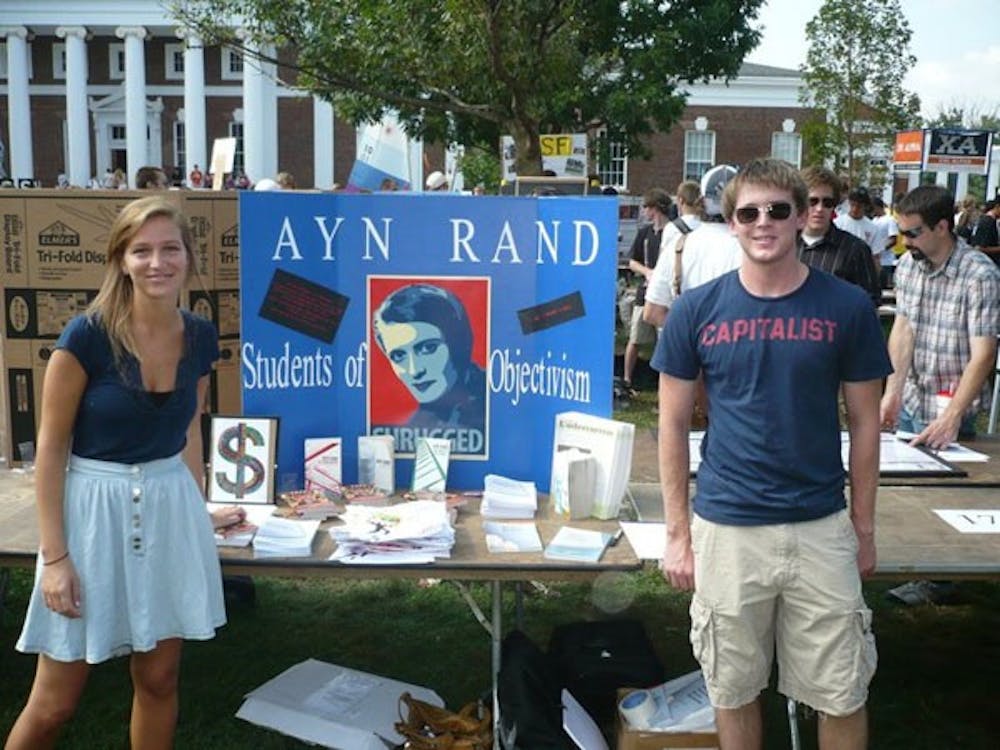College is a time of discovery, and in addition to worrying about classes and hanging out with friends, many students spend their four years of study contemplating what principles should govern their future lives. There is no right answer to this question, but for a small group of University students, there is a specific set of guidelines to be taken into account.
Students of Objectivism is a contracted independent organization on Grounds which attempts to apply the philosophies of author Ayn Rand to their own lives and the world around them.
Ayn Rand was a novelist and political theorist who fled Soviet Russia in 1925 to move to the United States. She is famous for her idea of objectivism, which she described as "a philosophy for living on earth." In her fictional works, most notably "Atlas Shrugged," Rand created characters who she believed embodied this ideal. After later abandoning her career as a novelist, Rand produced a series of non-fiction pieces in which she sought to define the principle of objectivism more clearly.
Since their publication, Rand's works have developed a global following and even led to the founding of the Ayn Rand Institute, a non-profit organization devoted to educating young people about the concepts of objectivism.
Second-year College student Ian Major became an Ayn Rand follower after reading "Atlas Shrugged" and other objectivist literature during the summer. Major said he was so enthralled he wanted to continue learning about Rand's beliefs when he returned to school.
"I immediately started searching for a campus club and found Students of Objectivism," he said.
There are many facets to Rand's philosophy, and full understanding requires a careful analysis of her works. Still, Sara Sherris, co-president of the organization, gave a brief summary of her understanding of objectivism.
"[Rand's] philosophy is comprehensive, in that it tries to answer questions in all areas of life. So politically, for instance, she is for laissez faire capitalism because she thinks the only proper role of government is to protect its citizens' individual rights," she said. "Ethically ... Rand puts the individual at the center. In other words, people are moral when they neither sacrifice themselves to others nor sacrifice others to themselves."
With these ideals in mind, the group meets once a week to have dinner and discuss the ways objectivism can be applied to current events. Co-president Will Fox calls these discussions "applied philosophy."
Fox said a recent discussion topic was the harsh parenting methods Amy Chua proposed in the Wall Street Journal article "Why Chinese Mothers are Superior."
"We discussed why that style [of raising a child] is not a good way to bring up a kid," Fox said. "The parents are not considering the kid's values at all."
In contrast, objectivism champions the role of the individual in taking responsibility for and determining the course of his own life.
In addition to its weekly meetings, Students of Objectivism also tries to coordinate two guest speakers each semester. Last semester they hosted Andrew Bernstein, a visiting professor at Marist College and a part time professor at State University of New York Purchase. He has authored multiple books, including "The Capitalist Manifesto: The Historic, Economic and Philosophic Case for Laissez-Faire." During his public talk, Bernstein discussed the idea of laissez-faire capitalism as a solution to global poverty.
Both Bernstein and this semester's first speaker were brought to the University through the joint efforts of Students of Objectivism and the Ayn Rand Institute. Dr. Keith Lokitch, a fellow of the Ayn Rand Center for Individual Rights, gave a speech criticizing the environmentalist movement.
The group frequently highlights controversial ideas such as those of Bernstein and Lokitch, and Fox admitted that even among members there are varying degrees of support for the application of objectivism to real world issues.
"A couple of us know a little more about the philosophy, while some people just find the point of view interesting," he said. Fox added that while the group is composed mainly of students with similar conservative beliefs, they welcome anyone wishing to join their discussion.
Whatever their personal take on objectivism, members value the time they spend discussing Rand's philosophy.
"There are right answers and you can figure them out by using your reason, your power of thinking, your mind," Sherris said. For this reason, she said, Students of Objectivism looks for "people who want to think. People who sincerely just want to figure out for themselves the world around them and what kind of person they want to be"







